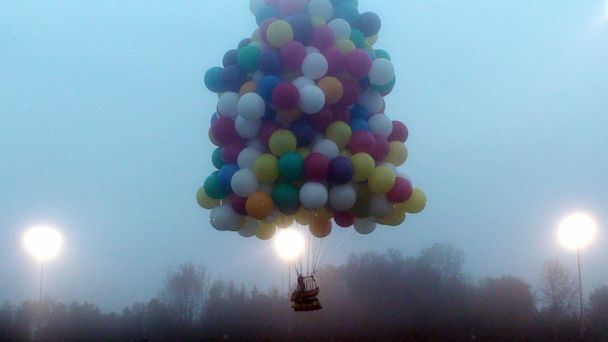Balloonist Crash Lands Attempting to Cross Atlantic
Balloonist Jonathan Trappe, who was attempting to become the first person to fly across the Atlantic using cluster balloons, says he thought he was going to die as he crash landed in complete darkness in Newfoundland, Canada.
"Honestly did not know if I would survive that landing," Trappe told Barcroft Media, which helped organize the attempt and handles Trappe's communications.
After landing safely, he put out a message saying, "Situation stable. Have 60l water 38L. Gatorade 60,000 cal food. Have shelter and exposure gear."
"Landed safe, at an alternate location. Remote," he wrote on his Facebook page." "I put the exposure canopy up on the boat. Will stay here for the night." The boat Trappe was referring to was actually the basket he was riding in, which doubles as a life boat in the event he needed to ditch in the ocean.
A joint effort of the Canada Border Services Agency and the Royal Canadian Mounted Police will begin shortly to locate Trappe in the forest where he crash landed. If authorities are unable to find him, he will spend another night in the wilderness, which is home to black bears and moose.

In this photo provided by Mark McBreairty, a balloon cluster carrying Jonathan Trappe lifts off from Caribou, Maine, on Sept. 12, 2013. Unlike a conventional hot-air balloon, Trappe lifted off Thursday using hundreds of helium-filled balloons clustered together with the hopes to be the first person to successfully complete a trans-Atlantic flight using the balloon cluster. (AP/Photo)
In a scene resembling the Disney movie "Up," Trappe began his ascent early Thursday morning under an umbrella of 370 brightly-colored balloons. He was seeking to become the first person to complete the Atlantic crossing using a cluster balloon system.
But he ran into problems with his balloons as he approached Newfoundland Thursday evening, it was not immediately clear exactly what the issue with the balloons was. Trappe's progress was being monitored via satellite.
He had spent two years preparing for the flight, including 100 days in Caribou, Maine, waiting for just the right weather conditions capable of carrying him across the ocean.
"Two years of work comes down to tonight, and then this flight," Trappe wrote on his website in advance of his lift-off. "Two years of work, and years more of dreams. My heart could never live a long life the way it is beating now."